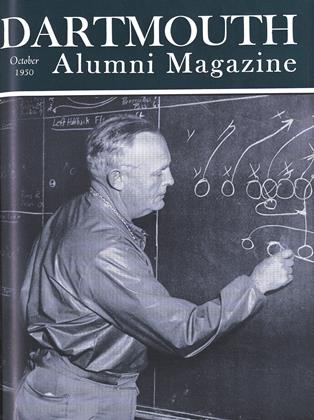The Plot Against thePeople, by Albert E. Kahn '34. Lear Publishers, New York, 1950; 572 pages; $3.00.
Treason, as defined by the framers of the Constitution, is limited to levying war against the United States or adhering to its enemies by giving them aid and comfort. The "high treason" which Mr. Kahn so passionately condemns is "treason against the American people." "Oppression through violence, terror and inquisition; the exploitation, despoilment and impoverishment of millions of men and women; despotic laws and the use of the courts as instruments of repression; fraudulent propaganda and the artificial pitting of one section of the public against another; the making of wars and the monstrous alchemy of converting man's blood into gold: all these," Mr. Kahn explains, "are forms of treason against the people."
Few would be so callous as to deny that in a moral sense these are indeed "high crimes" against humanity whenever they are committed and by whomever they are committed. Unfortunately, the only "traitors" which the author seems able to discern are those of the extreme Right. He deplores—and rightly sothe lynch mob and vigilante group who would take the law into their own unclean hands, the labor-baiting employer who would deny to his workers the rights they have so painfully won, and the native fascist and racist groups who would recast American society into an authoritarian mold. For his well-documented expose of the machinations of these groups in the period between and after both World Wars, Mr. Kahn deserves great credit. It is well to be reminded that the menace of the fascist mentality did not end with the fall of Hitler and Mussolini.
But if Mr. Kahn is aware of any danger of treason from the extreme Left, he fails to show it. He dismisses out of hand the notion that Soviet Russia could be aggressive in its intentions or that American Communists could be its willing and obedient dupes. The current anti-Red hysteria, he hints at one point, has been deliberately "manufactured" so as to provide an outlet for the disposition of "unsold goods piled up in the nation's warehouses." To listen to Mr. Kahn one might suppose that Communism was merely an
"international anti-fascist struggle" with no positive doctrinal content of its own with implications as totalitarian as those he rightfully deplores in Fascism. Actually, by his own definition, American Communists stand convicted of the very kind of "treason" with which he has charged totalitarians of the extreme Right. What is more, there is every reason to believe, Mr. Kahn to the contrary, theirs is easily the more "clear and present danger."
 View Full Issue
View Full Issue
More From This Issue
-
 Sports
SportsFINIS
October 1950 By Bernard G. Sykes '51 -
 Article
ArticleMan on the Job . . . for Thirty Years
October 1950 By JOHN HURD '21 -
 Class Notes
Class Notes1918
October 1950 By ERNEST H. EARLEY, DONALD L. BARR, DAVID L. GARRATT -
 Class Notes
Class Notes1923
October 1950 By TRUMAN T. METZEL, COLIN C. STEWART 3RD, JULIUS A. RIPPEL -
 Class Notes
Class Notes1905
October 1950 By GEORGE W. PUTNAM, GILBERT H. FALL -
 Article
ArticleTHERE'S METHOD Behind the Fall Madness
October 1950 By ROGER K. WOLBARST '43
Robert B. Dishman
Books
-
 Books
BooksAlumni Articles
December 1946 -
 Books
BooksTHE PACIFIC SALMON FISHERIES, A STUDY OF IRRATIONAL CONSERVATION.
OCTOBER 1969 By ELLIS O. BRIGGS '21 -
 Books
BooksTHE AMERICAN EAGLE.
February 1935 By Frederic P. Lord '98 -
 Books
BooksREBELS AND GENTLEMEN
December 1942 By Herbert Wells Hill -
 Books
BooksTHE LONELY CRO WD: A STUDY OF THE CHANGING AMERICAN CHARACTER
April 1951 By KENNETH A. ROBINSON -
 Books
BooksTHE STORY OF AMERICAN DISSENT.
November 1934 By Malcolm Keir



